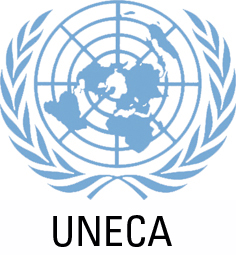Focal point
Location
P.O. Box 3001
Addis Ababa, Ethiopia
Established by the Economic and Social Council (ECOSOC) of the United Nations (UN) in 1958 as one of the UN's five regional commissions, ECA's mandate is to promote the economic and social development of its member States, foster intra-regional integration, and promote international cooperation for Africa's development.
Made up of 54 member States, and playing a dual role as a regional arm of the UN and as a key component of the African institutional landscape, ECA is well positioned to make unique contributions to address the Continent’s development challenges.
ECA’s thematic areas of focus are as follows:
- Macroeconomic Policy
- Regional Integration and Trade
- Social Development
- Natural Resources
- Innovation and Technology
- Gender
- Governance
Members:
Resources
Displaying 451 - 455 of 872Report on inter-state co-operation with respect to the production and distribution of agricultural inputs
Prom several converging estimates, world's population is expected to reach 6.1 billion by the year 2000 or 1.7 billion more than in 1980. Most of the increase in population will be generated by developing countries in general and by African countries in particular. This means there will have to be a substantial increase in world food production of at least 50 percent.
Amélioration des politiques et programmes de commercialisation et de crédit agricole : distribution des facteurs de production, épargne rurale et services de crédit en faveur des petits exploitants
Le présent rapport a pour objectif d'examiner les résultats obtenus, de recenser les expériences novatrices et de fournir un cadre de discussion pour l'avenir. Cette politique s'expliquait par les choix politiques des dirigeants nationaux, le désir des gouvernements de pays nouvellement indépendants d'innover et d'agir rapidement, la nécessite d'apaiser les groupes de pression intérieurs, et, quelquefois, le manque de données fiables sur l'efficacité de ces systèmes au niveau de l'exploitation agricole.
Amélioration des politiques et programmes de commercialisation et de crédit agricole : distribution des facteurs de production, épargne rurale et services de crédit en faveur des petits exploitants
Le présent rapport a pour objectif d'examiner les résultats obtenus, de recenser les expériences novatrices et de fournir un cadre de discussion pour l'avenir. Cette politique s'expliquait par les choix politiques des dirigeants nationaux, le désir des gouvernements de pays nouvellement indépendants d'innover et d'agir rapidement, la nécessite d'apaiser les groupes de pression intérieurs, et, quelquefois, le manque de données fiables sur l'efficacité de ces systèmes au niveau de l'exploitation agricole.
Report on measures to be taken to improve basic statistics on women in agriculture in Africa
In Africa, agriculture is the most important sector in national economies. About 80 per cent of the active population works in agriculture. Further, apart from few exceptions, agriculture makes up more than 50 percent of gross national product. Nevertheless, Africa remains the only region in the world in which agricultural production declined between 1970 and 1980, when the growth rate was less than 2 per cent and moreover the gross national product (GNP) per head is one of the lowest in the world.
Report on measures to be taken to improve basic statistics on women in agriculture in Africa
In Africa, agriculture is the most important sector in national economies. About 80 per cent of the active population works in agriculture. Further, apart from few exceptions, agriculture makes up more than 50 percent of gross national product. Nevertheless, Africa remains the only region in the world in which agricultural production declined between 1970 and 1980, when the growth rate was less than 2 per cent and moreover the gross national product (GNP) per head is one of the lowest in the world.


